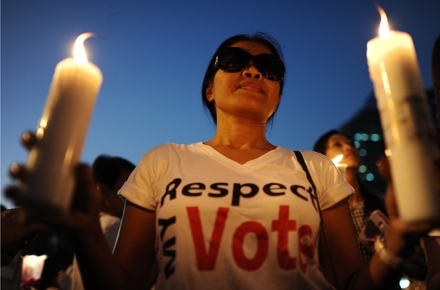Ballots over bullets
There’s no doubt Yingluck Shinawatra will win in Thailand’s elections this Sunday. Whether the opposition respects the outcome is another question, writes Andrew Walker.
The political crisis playing out on the streets of Bangkok revolves around one central question – is the Thai electorate the best judge of Thailand’s political future?
The government of Prime Minister Yingluck Shinawatra is firmly in the “yes” camp. Faced with growing street protests in December she dissolved parliament and called a snap election. Despite strenuous criticism of her opportunism, she has remained committed to the election—scheduled for Sunday—ever since, even though the Constitutional Court has told her she has the power to delay it. After anti-government protesters successfully disrupted pre-poll voting in Bangkok, some thought she would waver, fearing widespread violence on election day. She didn’t.
Of course, Yingluck’s commitment to electoral democracy is self-serving. She is determined to hold an election because she knows she will win it. Her brother, Thaksin Shinawatra, first came to power in the election of 2001. Thaksin or his allies have won every election since – 2005, 2006, 2007, and under Yingluck, in 2011. A military coup in 2006 and a series of unfavourable court rulings have not dented the electoral power of Thaksin’s political forces even though Thaksin himself now lives in exile.
The persistent pro-Thaksin judgement of the electorate infuriates Thailand’s opposition forces. The anti-government protesters are also self-serving in their judgement. They are bitterly opposed to an election because they know they will lose.
The main opposition party, the ironically-named Democrat Party, has not won an election in more than 20 years. When Thaksin responded to street protests in 2006 by calling a snap election, the Democrats boycotted it. Facing yet another defeat at Sunday’s poll they are playing the boycott card again. Not content with simply boycotting, anti-government protesters in Bangkok have made it clear that they will do everything they can to prevent voters making their way to the polls. Clashes are inevitable.
The opposition’s contempt for Yingluck’s snap election is the latest episode in a long standing tradition of democratic ambivalence in Thailand. Throughout Thailand’s 80-year dalliance with democracy there have been persistent claims that voters, especially in the populous rural regions, are not fit to exercise sound electoral judgement. Despite being subject to regular campaigns to train them in correct democratic behaviour, rural voters have never been fully accepted as democratic citizens. Election results are readily explained away – by the losers of course – as being the product of gormless villagers selling their votes to corrupt and manipulative politicians.
After long-term research in rural Thailand, I have a much more positive view about the political judgements of Thailand’s voters. I have found a rich, irreverent and dynamic political culture. The informal evaluation of governments and their policies is a routine part of everyday life. Policies and programs have a direct impact on livelihoods, so they are a natural subject for discussion and debate. Some voters are unengaged; some are passionately committed; most lie somewhere in between. There’s nothing unusual, or undesirable, about that. Political candidates, on all sides, certainly distribute cash before elections, but voters routinely evaluate these gifts against the records and reputations of those who are trying to secure their support.
This local scrutiny provides the underpinning for a robust and resilient electoral culture. Opinion surveys have regularly found that voters in Thailand have a strong commitment to democratic values. Credible commentators are also agreed that Thai elections over the past decade, while not perfect, have reflected the genuine political will of the electorate.
While Yingluck’s commitment to an electoral outcome is self-serving, she is on the right side of history. Since Thaksin came to power in 2001 large portions of the electorate have experienced significant improvements in their standards of living. In the northeast of Thailand, the country’s largest and poorest region, more than four million people moved above the poverty line in the decade following Thaksin’s election. Unsurprisingly, this is the government’s electoral heartland.
There is plenty of room for debate about how directly Thaksin’s policies have contributed to Thailand’s strong economic growth and poverty reduction. And there are also important questions about the personal benefits that Thaksin and his cronies have derived from government coffers. These are important debates, and they are routinely held in the paddy fields, markets and noodle shops of Thailand. The product of that highly decentralised debate has been that, on balance, Thaksin and his allies deserve re-election.
That’s a judgement that warrants respect.
Respecting the electorate’s judgement may be an impossibly bitter pill for the anti-government forces to swallow. But it would be in their interests to do so.
Since the military coup against Thaksin in 2006, Thailand’s opposition has been diverted down a series of non-democratic blind alleys, none of which succeeded in displacing Thaksin’s political influence. The latest round of provocation on the streets of Bangkok reflects the opposition’s weakness, not its strength. The anti-government forces are now stuck in a contradictory cul-de-sac, unprepared to electorally challenge an administration they claim is widely regarded as a disaster for Thailand.
Thailand’s opposition needs to accept the verdict of the electorate and set out on the long road towards rebuilding its electoral base with policies that respond to the dramatic socio-economic transformation that has occurred in provincial Thailand.
Yingluck will be the winner in the short term. But, for the longer term, Thailand desperately needs a viable opposition whose alternative policies can provide grist to the democratic mill of everyday discussion in towns and villages throughout Thailand.
Professor Andrew Walker is the author of Thailand’s political peasants and Deputy Dean at The Australian National University’s College of Asia and the Pacific.







